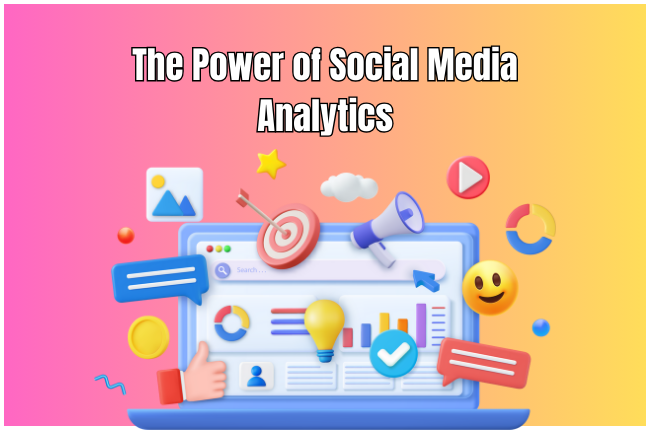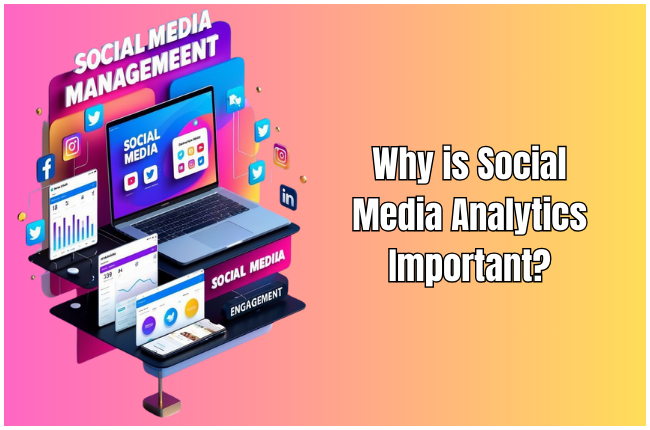The Power of Social Media Analytics: Turning Data into Business Success
In today’s digital world, social media has become an integral part of any business strategy. Whether you’re a small start-up or an established corporation, platforms like Facebook, Instagram, Twitter, and LinkedIn offer unparalleled opportunities to engage with your audience, build brand awareness, and drive sales. But how do you know if your efforts are truly paying off? That’s where social media analytics come in.

What is Social Media Analytics?
Social media analytics refers to the collection, measurement, and analysis of data from social media platforms to track the performance of your content and campaigns. These insights help businesses understand what’s working, what’s not, and how to optimize their strategies for better results.
Think of it like having a GPS for your social media journey. Instead of guessing where your audience is or how they behave, you can use real-time data to make informed decisions that lead to measurable success.

Why is Social Media Analytics Important?
- Understand Audience Behavior
Every like, comment, share, and click generates data about your audience’s preferences, behaviors, and interests. By analyzing this data, you can learn what type of content resonates most with your followers, what time they are most active, and which platforms they engage with the most. Armed with this information, you can tailor your content to meet their needs, making your marketing efforts more effective.
- Track Campaign Performance
Social media analytics allows you to track key metrics like engagement rates, impressions, clicks, and conversions. This data shows how well your campaigns are performing, helping you adjust strategies in real-time. Are your paid ads yielding the desired return on investment (ROI)? Are organic posts driving traffic to your website? With analytics, you can answer these questions and refine your approach accordingly.
- Refine Your Strategy
Social media is dynamic, and what worked yesterday may not work today. Analytics allows you to continually monitor your performance, test new ideas, and tweak your strategy based on real-time feedback. For example, if a particular type of post generates high engagement, you can create more of that content. Alternatively, if a campaign is underperforming, you can quickly pivot to a new tactic to get back on track.
- Boost Customer Satisfaction
Analytics isn’t just about improving your bottom line; it also helps enhance customer satisfaction. By monitoring feedback, reviews, and mentions, businesses can gain a deeper understanding of their customers’ sentiments. This allows companies to address concerns, respond to customer inquiries, and improve their overall brand perception. A positive customer experience translates into brand loyalty and increased customer retention.
- Measure ROI
Ultimately, the goal of any marketing effort is to achieve a solid return on investment. Social media analytics help you measure ROI by connecting social media activity with business outcomes such as lead generation, sales, and customer acquisition. You can track how many leads came from a Facebook ad, how much traffic was driven by Instagram stories, and whether your LinkedIn posts contributed to new partnerships. Knowing the ROI of your social media campaigns helps you allocate resources more effectively and justify your marketing budget.

How to Leverage Social Media Analytics for Business Success
- Set Clear Goals
Before diving into analytics, define what you want to achieve with your social media efforts. Whether it’s brand awareness, lead generation, customer engagement, or sales, having clear goals will help you focus on the metrics that matter most.
- Use the Right Tools
There are numerous social media analytics tools available, ranging from platform-specific insights (like Facebook Insights or Instagram Analytics) to comprehensive third-party tools such as Google Analytics, Hootsuite, and Sprout Social. These tools provide valuable insights into performance and audience behavior, giving you a well-rounded view of your social media impact.
- Measure Key Metrics
Focus on metrics that align with your business goals. Some of the key metrics to consider include:
- Engagement Rate: Measures how well your audience interacts with your posts.
- Click-Through Rate (CTR): Tracks the percentage of people who clicked on a link in your post.
- Conversion Rate: The percentage of users who take a desired action, such as making a purchase.
- Follower Growth: Measures how fast your audience is growing over time.
- Analyze Competitors
Don’t forget to keep an eye on your competitors. Social media analytics tools often allow you to analyze competitor performance as well. By comparing your metrics with those of similar businesses, you can identify gaps in your strategy and capitalize on opportunities your competitors may have missed.
- Test and Experiment
A/B testing is a powerful way to fine-tune your social media strategies. Test different types of content, posting times, headlines, and images to see what resonates best with your audience. Social media analytics can help you track the performance of these tests and provide insights into what works and what doesn’t.
Conclusion
Social media analytics is more than just tracking likes and shares; it’s about using data to make smarter, more informed decisions that drive business growth. By harnessing the power of social media analytics, you can optimize your strategies, engage more effectively with your audience, and ultimately turn data into business success.
In a fast-paced digital landscape, staying ahead of trends and understanding your audience’s behavior is crucial. So, don’t just rely on gut feeling—let data guide you on your path to success!

